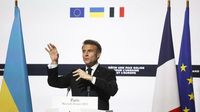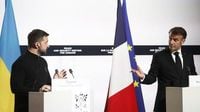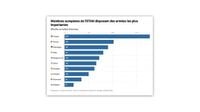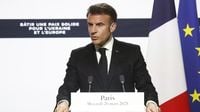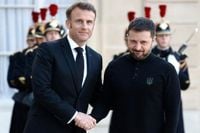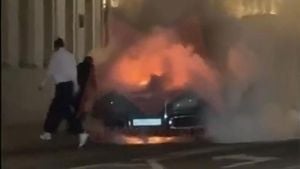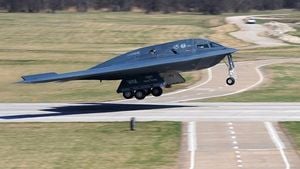In a significant move, French President Emmanuel Macron is hosting a summit today in Paris aimed at bolstering Ukraine's security amid ongoing tensions with Russia. The summit, dubbed the "coalition of volunteers," comes on the heels of negotiations that took place in Riyadh, where the absence of European representatives raised eyebrows. Notably, the summit will feature Ukrainian President Volodymyr Zelensky and Defense Minister Rustem Umerov, with representatives from 31 countries, including EU member states, the UK, Norway, Iceland, and Turkey expected to attend.
This marks the third meeting of the coalition, following recent discussions in London organized by British Prime Minister Keir Starmer on March 3 and March 15. Macron's initiative underscores the urgency of addressing security concerns as Russia continues to impose conditions for a ceasefire, particularly regarding sanctions against Russian banks.
On March 25, negotiations among Russia, Ukraine, and the U.S. concluded in Riyadh without European involvement, which has led to increased scrutiny of the situation. Russia has stated that agreements concerning the Black Sea would only take effect after sanctions against the Russian Agricultural Bank (RSHB) and other banks are lifted, as well as their reconnection to the SWIFT international payment system.
Macron has firmly rejected these demands, emphasizing that the end of Russian aggression and the unconditional withdrawal of Russian military forces from Ukraine are prerequisites for any discussion regarding sanctions. The EU spokesperson reinforced this stance, stating that the conditions for lifting sanctions are tied to Russia's compliance with international law.
As the summit unfolds, discussions are expected to pivot towards establishing a force focused on air and sea security, rather than the originally proposed ground contingent. European diplomats have indicated that logistical challenges and skepticism from Washington have led to a reassessment of military ambitions. Russia's President Vladimir Putin has repeatedly expressed his opposition to any peacekeeping forces in Ukraine.
In light of these developments, Macron has announced an additional two billion euros in military aid to Ukraine. This package includes essential support such as Milan anti-tank missiles, Mica air defense systems, Mistral ground-to-air missiles, VAB armored vehicles, AMX-10 RC tanks, and drones. Furthermore, Macron has highlighted the importance of strengthening Ukraine's military capabilities as a means of ensuring security.
During a joint press conference with Zelensky on March 26, Macron reiterated his commitment to a peaceful resolution, stating that any European troops deployed in the event of a ceasefire would not engage in combat but would focus on monitoring and training to prevent further aggression. Zelensky echoed this sentiment, asserting that any European presence should aim to stabilize the situation and deter future Russian attacks.
However, the path to peace remains fraught with challenges. U.S. Secretary of State Marco Rubio acknowledged that reaching a peace agreement between Moscow and Kiev "will not be simple" and "will take time." Both nations have accused one another of undermining a U.S.-brokered truce, which included a moratorium on strikes targeting energy sites in the Black Sea region.
As tensions escalate, Zelensky has criticized Russia for attempting to divide European unity, pointing to Hungary's occasional obstruction of sanctions against Moscow as an example. He believes that Putin's primary goal is to weaken European solidarity in the face of aggression.
In a further escalation, Russia claimed to have downed two Ukrainian drones over the Black Sea and has conducted multiple strikes on Ukrainian energy facilities since announcing a halt, signaling a reluctance to pursue peace. Zelensky described these actions as a "clear signal" that Moscow is not genuinely interested in resolving the conflict.
In the context of these geopolitical maneuvers, Macron's summit aims to finalize the security guarantees for Ukraine, emphasizing the need for European allies to collaborate independently of American mediation. The discussions will also include the potential for increased military support, including the possibility of enhancing the number of Mirage fighter jets supplied to Ukraine.
As the summit progresses, Macron's leadership is being tested as he seeks to position Europe at the forefront of diplomatic efforts to end the conflict in Ukraine. The stakes are high, and the outcome of today's discussions could shape the future of European security and the ongoing struggle against Russian aggression.
With the international community's eyes on Paris, the summit represents a pivotal moment for Ukraine and its allies. The commitment to bolster military support and establish a unified front against Russian demands reflects a growing recognition of the need for decisive action in the face of ongoing hostilities.
As the world watches closely, the hope for a peaceful resolution remains tenuous, underscoring the complexities involved in achieving lasting stability in the region.
